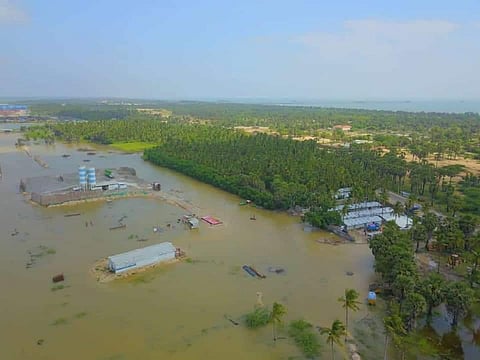

THOOTHUKUDI: Even as the Udangudi Super Critical Thermal Power Plant construction site was inundated during the northeast monsoon rains, the concerned authorities had allegedly attempted to break a check dam to remove the stagnant water.
The check dam is built on a surplus channel that runs behind the construction site diverting water to the Kulasekarapattinam Tharuvai tank when Ellapanayakankulam tank overflows.
On November 25, the check dam built on the same surplus channel at Muthu Nagar was broken by unidentified persons and a complaint was given by advocate B Ram Kumar Aditya with Kulasekarapattinam police on behalf of the residents and farmers.
Again around 10.30 pm on Friday, machinery were brought to break another checkdam near Kulasekarapattinam.
Udangudi and Kulasekarapattinam villagers gheraoed the lorry carrying machines, however, the police intervened and released the lorry from the agitators. A resident, Murugan, said, "The company officials had already broken a check dam at Muthu Nagar. They brought large machines to break another one on Friday night"
Activist V Gunaselan said, "These check dams were built on the surplus channel a decade ago to protect groundwater from becoming saline. The tanks in Udangudi fills only twice in a decade, so it is necessary to manage the rainwater to improve groundwater table. After breaking the dam, the authorities are trying to break another check dam and the district administration should not remain silent".
The State government had awarded construction of the Udangudi super critical thermal project (2X660 MW) phase 1 project on an area of 939 acres in Kallamozhi village to the Bharat Heavy Electrical Limited (BHEL) at an estimated cost of Rs 13,076.705 crore, including Rs 7,359 crore for the construction and Rs 1,902.87 crore for the captive coal jetty being built eight miles off the shores.
Meanwhile, BHEL had floated a tender for levelling and grading the green belt area, which is considered as the water catchment area, according to the villagers.
"Constructors were heaping sand excavated from tanks under Kudimaramathu scheme at the construction site to level the land surface, since it was an 8 feet deep water catchment area," said advocate Adityan adding how the construction will be strong in a marshy land.
The heavy rains of the northeast monsoon brought the construction work to a grinding halt for the past one month and the water is yet to drain.
"The Ellapanayakankulam tank surplus channel which runs through the plant site is the only option to divert the water stagnation, hence the check dams on the same channel flow has been targeted to break by the BHEL authorities" said the advocate adding the construction site is 2 meter above the mean sea level according to the Environment Impact Assessment report.
Speaking to TNIE, TANGEDCO Director (Project) said that he had not received any complaint yet and assured that an inquiry would be initiated. Acknowledging that rain water had inundated the construction site, but other works are continuing at the site, he added.
A petition seeking to quash licence for the construction of the thermal plant, citing it encroaches a water body as one of the ground, was dismissed by the Madurai Bench of the Madras High Court in January, 2019. The Court directed the petitioner to approach the National Green Tribunal (NGT).
However, NGT also refused to entertain the case citing that the petitioner should have approached within six months after the licence was given to the firm.